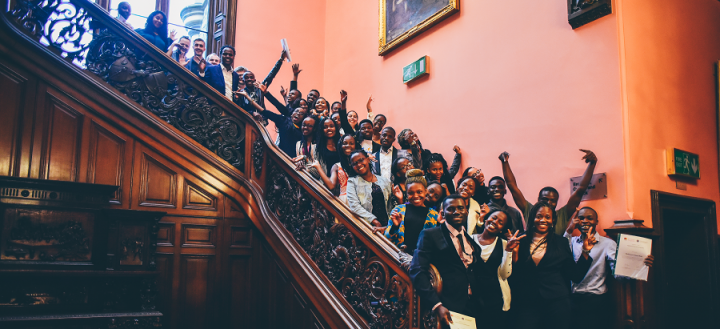Equality, diversity and inclusion
As well as widening participation, we continue to work with our staff and students to deepen our commitment to equality, diversity and inclusion across all areas of the University.

In April 2021, we published new Equality Outcomes along with a Mainstreaming Progress Report.
Many people across the University are involved in promoting equity and social justice through a range of activities which serve to raise awareness, challenge structural barriers and prevent discrimination and harassment.
Their expertise, energy and commitment reflect our underlying values and motivation towards positive change.
Equality, Diversity and Inclusion (EDI) Committee
The Equality, Diversity and Inclusion (EDI) Committee brings student representatives, convenors of College and Professional Service Group EDI committees, and convenors of staff networks together with other stakeholders to develop strategy, approve and monitor action plans and identify priorities.
In the last year, two sub-committees have been set up – ‘Race Equality and Anti-Racism’ and ‘Gender Equality’ – and their action plans guide much activity. The University has used the Genuine Occupational Requirement to recruit Black, Asian and Minority Ethnic counsellors to reflect student need.
Equality, Diversity and Inclusion Committee
Decolonising the curriculum
Many Schools are now developing approaches to decolonise the curriculum and the University has started a process of engagement and review of its historical links to the Atlantic slave trade, colonialism and their racial legacies today, with the steering group chaired by Sir Geoff Palmer.
We always strive to improve overall EDI literacy through the development of training and resources for staff and students. GenderED and RACE.ED are vibrant hubs for teaching, research and knowledge exchange with excellent events for the University and wider community.
Scholars at Risk (SAR)
In March 2021, the University was recognised for its work in supporting persecuted scholars and defending academic freedom as a Sustaining Member of the Scholars at Risk (SAR) network.
A network of over 530 higher education institutions – including The University of Edinburgh – in 42 countries and assisting hundreds of scholars each year, SAR works to protect scholars whose lives, liberty and well-being are threatened across the globe.
As a Sustaining Member of the network, we are at the forefront of a dynamic global movement rooted in a vision of a world in which everyone enjoys the freedom to think, question, and share ideas.
Foundations for All
Edinburgh is proud to be part of an internationally collaborative programme, Foundations for All, which provides insights on how to effectively facilitate access to, and future success in, higher education for displaced and refugee young people in resource-poor environments through contextualised blended bridging programmes.
This action-based project will research and evaluate the implementation of a blended-learning ‘Foundations for All’ degree for refugee scholars. The one-year programme will be offered online, equipping refugee scholars who have had their education disrupted or are unable to provide documentation of their academic record, with skills and a qualification that will allow them to begin an undergraduate degree.
News: project update: Foundations for All
Mastercard Foundation Scholars
The work of the Mastercard Foundation Scholars programme continues to provide full scholarships to the best students from across the African continent. Through 2020 our partnership with the University of Witwatersrand (Wits) in South Africa has been taking shape and generating a growing number of institution wide research links, as University staff work closely with the group Africa Fellows to further develop our joint learning and teaching links.
Mastercard Foundation Scholars Program
Scholarships
Our work to increase scholarship provision in South Asia has generated success this year. In order to increase diversity as well as grow the funding allocation, we have been developing relations with external partners such as the UK Government and British Council on campaigns such as GREAT to co-fund 25 new scholarships.
A new STEM scholarship for women is being offered at Edinburgh to students from South Asia. It is part of a wider programme by the British Council to increase opportunities in STEM for women.
Scholarships and student funding
Brexit and Covid-19
To ensure that Edinburgh student mobility and student exchange continues post-Brexit and after our exit from Erasmus, we submitted a bid to the Turing Scheme in March 2021 for a funding allocation to support our students for mobility and placements. The first Turing funded placements will begin in September 2021.
Throughout the Covid-19 pandemic, we have considered the differential impact on equality groups and sought to embed EDI throughout the process of adaptation and renewal. Over 400 Equality Impact Assessments were conducted to ensure the consideration of EDI in safe working practices during the pandemic.
The Chancellor’s Fellowship Scheme in 2020 offered 30 tenure-track posts to internal candidates with fixed-term contracts, to support job security for our talented researchers. Recognising the unequal impacts of Covid-19, we set ambitious gender and ethnicity targets for recruitment (50 per cent women and 20 per cent Black, Asian and Minority Ethnic fellows). Recruitment panels were supported by comprehensive equality guidance, and our targets were met.
We continue to publish our Equality data and utilise such evidence to assess progress and identify areas for action.

